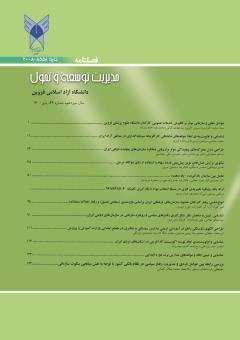کاوش و رتبهبندی پیشایندها و پسایندهای سبک رهبری مشترک در نظام آموزشی
محورهای موضوعی : مدیریترضا معروفی 1 , کاوه تیمورنژاد 2 , محمدجواد کاملی 3
1 - دانشجوی دکتری، گروه مدیریت دولتی، واحد قزوین، دانشگاه آزاد اسلامی، قزوین، ایران.
2 - گروه مدیریت دولتی، دانشکده مدیریت، واحد تهران مرکزی، دانشگاه آزاد اسلامی، تهران، ایران.
3 - گروه مدیریت منابعانسانی، دانشکده منابع سازمانی، دانشگاه علوم انتظامی امین، تهران، ایران.
کلید واژه: پیشایندها, پسایندها, سبک رهبری مشترک, نظام آموزشی.,
چکیده مقاله :
پژوهش حاضر با هدف کاوش و رتبهبندی پیشایندها و پسایندهای سبک رهبری مشترک در نظام آموزش عالی انجام شده است. این پژوهش به لحاظ هدف کاربردی و از منظر نوع شناسی، یک مطالعه آمیخته اکتشافی با رهیافت استقرایی است. جامعه آماری در بخش کیفی، خبرگان دانشگاهی هستند که با روش هدفمند، 13 نفر انتخاب شدند. جامعه آماری بخش کمی، اساتید و اعضای هیئتعلمی دانشگاه آزاد اسلامی استان آذربایجان غربی هستند که با راهبرد نمونهگیری در دسترس، 26 نفر تعیین شدند. ابزار گردآوری دادهها در بخش کیفی مصاحبه نیمه ساختاریافته و در بخش کمی پرسشنامه است. مصاحبهها با روش تحلیل مضمون و نرمافزار Maxqda2020 و پرسشنامهها با روش دلفی فازی و نرمافزار اکسل تحلیل شدند. یافتهها نشان میدهد که پیشایندهای سبک رهبری مشترک شامل 11 مقوله افزایش پیچیدگیهای محیطی، چشمانداز مشترک، تغییرات فناورانه آموزشی، ایجاد دانشگاه تحول ساز، نیاز به انعطافپذیری پویا، توانمندسازی اعضای هیئتعلمی، جمعگرایی تصمیم و کاهش فاصله قدرت، ایده پردازی تیمی، تغییر در ساختار سازمانی، ویژگیهای شخصیتی و ویژگیهای ارتباطی رهبران ساختاردهی است. پسایندهای رهبری مشترک نیز شامل ارتقای مشارکتجویی و مشارکتپذیری، بهبود تصمیمگیری گروهی، افزایش خلاقیت و نوآوری، پاسخگویی و مسئولیتپذیری، دستیابی به دانشگاه کارآفرین، افزایش بهرهوری، برجستگی اعتبار و شهرت دانشگاه، بهبود تعلق و تعهد سازمانی، افزایش اشتیاق شغلی، افزایش رفتارهای شهروندی، ارتقای بهزیستی روانشناختی است. از میان پیشایندها، بالاترین رتبه مربوط به افزایش پیچیدگیهای محیطی و در میان پسایندها نیز بالاترین رتبه مربوط به ارتقای مشارکتجویی و مشارکتپذیری است.
The purpose of this study was to explore and rank the antecedents and consequences of shared leadership style in the educational system. This research is applied in terms of purpose, and from a typological point of view, is a mixed exploration study with inductive approach. The statistical population of the quantitative part is the professors and faculty members of the Islamic Azad University of West Azerbaijan, which were determined 26 people with the convenience sampling strategy. The data gathering tool in the qualitative section is semi -structured interview and in the quantitative part, is the questionnaire. Interviews were analyzed using theme analysis method and MAXQDA2020 software, and questionnaires by using the fuzzy Delphi Method and Excel software. Findings show that Shared leadership antecedents including the 11 categories: increased environmental complexity, shared perspective, educational technological changes, transformational university creation, need for dynamic flexibility, faculty members empowerment, Collectivism of Decision -making and reduction of power distance, team Idealization, change in organizational structure, personality traits, and leader communication traits. In addition, the shared leadership Consequences include: enhancing participate and participation, improving group decision -making, increasing creativity and innovation, accountability and responsibility, access to entrepreneurial university, increased productivity, credibility and reputation of university, Improvement of organizational engagement and commitment, increasing job passion of employee and faculty members, increase citizenship behaviors, promote psychological well -being. Among the shared leadership antecedents, the highest rank is increase environmental complexity and among the consequences, the highest rank is promote participate and participation.


